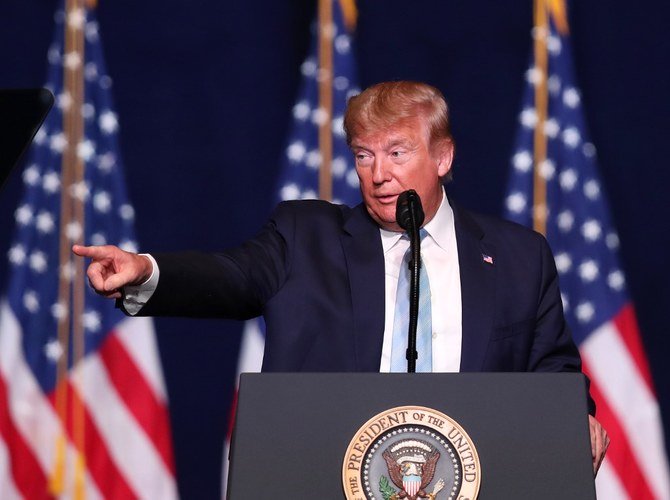
- ARAB NEWS
- 06 Jul 2025

American generals have previously said that President Donald Trump only trusts his own instincts. In this respect, Iran has, for a while, been trying to test his conflicting instincts: Those of isolationism versus the sensation of greatness. Iran has kept raising the stakes, testing Trump’s patience and trying to see which instinct will prevail. In terms of foreign policy, Trump has made contradicting promises to his support base. One of his promises is to end the “endless wars” and detangle the US from the Middle East’s problems. At the same time, he promised them “greatness” and to make the enemies of the US pay a high price for harming its personnel or its interests.
Iran has been pushing the limits with Trump. In June, it shot down an unmanned plane flying over international waters. Though the Pentagon ordered a retaliatory attack, Trump canceled it 10 minutes before the launch. He gave an excuse that the human casualties that would have resulted from the strike were not proportional to the damage inflicted by Iran. Many found his excuse to be lame, saying it emboldened Iran and encouraged it to further mock the US and its president. The attacks on oil facilities in Saudi Arabia in September confirmed this fact. Iran did not seem to care that the attack was described as an “act of war” by the US, while the threat of “obliteration like never seen before” was ignored.
Trump has been trying to find a compromise between these two instincts by fighting Iran economically and making the Islamic Republic pay a high price for its destabilizing behavior in the region. In May, in an interview with CNN, Secretary of State Mike Pompeo clearly stated that the US was not seeking a war with Iran — but he also said that the US would answer any Iranian aggression “decisively.”
Recently, Iran increased its provocations of Trump. When the US president said Tehran would be held responsible following last week’s attack on the American embassy in Baghdad, Supreme Leader Ali Khamenei went after Trump directly. Though he rarely addresses the American president, he mocked him on Twitter by saying that Trump “can’t do anything.” Khamenei made this statement after Iranian-backed militiamen had stormed the Baghdad embassy twice in two days, an American contractor was killed by an Iranian proxy militia, and Iranian rocket attacks had targeted US interests in Iraq and across the Middle East for months.
Though Trump might not want a war, he needs to be ready to face an escalation
Dr. Dania Koleilat Khatib
Friday’s assassination of Quds Force commander Qassem Soleimani on the direct orders of Trump is a shift from words to action. After the killing of Soleimani and militia leader Abu Mahdi Al-Muhandis as they left Baghdad airport, Trump said that he does not seek to start a war but rather to stop one. However, it is important to see if the US has a contingency plan. For sure, Trump has made a big score. He was able to eliminate an enemy who has “American blood on his hands,” as stated by Sen. Lindsey Graham. However, taking this bold step means that Trump will not be able to turn back easily. Though he might not want a war, he needs to be ready to face an escalation. The important question is what is the follow-up strategy? In this critical period, the stakes are high, especially in light of the protests in Lebanon and Iraq.
Iran is in a tough spot. Not only does it feel cornered by American sanctions, but its influence in Lebanon and Iraq seems challenged. Regular citizens who are fed up with corruption are denouncing the regimes that are Iran’s main allies in the region. However, Iran cannot show weakness and risk losing its influence in Beirut and Baghdad and maybe even Damascus. There is no doubt that the death of Soleimani is a strategic setback for the Iranians. However, the regime now has a “martyr” it can claim revenge for.
The stakes are high for the American administration too. The death of Soleimani has changed the rules of engagement. The US has moved from the proxy and economic war sphere to a direct confrontation with Iran. Though Pompeo said the US is committed to de-escalation, the escalation has already happened. The question is: Will there be a follow-through? Unfortunately, the US’ recent history in the region shows there will be no follow-through. In Iraq, the US went in without a strategy and, as soon as a plan started to materialize, Barack Obama pulled out prematurely.
Will Trump draft a coherent strategy to follow up the killing of Soleimani or will he continue to swing between conflicting instincts and promises to his voters in an election year? One sure thing is that, when the American president took the decision to directly target a high-profile personality such as Soleimani, who was a symbol of the Islamic revolution, he made a decisive move and it will be difficult to change course. If Trump’s isolationist instinct comes back to haunt him, he will surely be killing American “greatness” for good.